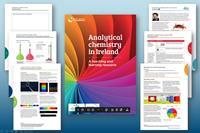Essential to any research and development is a core understanding of analytical chemistry
Ireland is continuing to invest in its rapidly expanding pharmaceutical and related manufacturing sector. This includes the biological and chemical industries and third-level research initiatives across the country. As this area of the economy develops even further, new researchers and talented individuals with the right skills and knowledge are required.1
We developed this resource to support secondary school teachers to develop analytical chemistry skills. Find curriculum-linked activities, inspiring real-life career stories and application-based assessment to develop the necessary scientific inquiry skills through four suggested student projects.
How to use this resource
In this resource you will find a variety of content including worksheets, project-based learning tasks and contextualisation stories. We have segmented all the material so that it can be used in a mix-and-match style that works best with your particular teaching approach, student cohort and learning objectives. To support you in easily sourcing the content you need, the booklet is divided into colour-coded subsections.
There are distinct subsections designed to help plan and run a series of lessons and set your class a group project designed to build student skills and contextual awareness in an area relating to analytical chemistry.
The Introducing scientific skills sections contain suggested lesson ideas for teachers and student information sheets to provide the theoretical background to key analytical topics. In the Quantitative chemistry ideas section, you will find further teaching ideas and student examples to cement learning.
The Applying scientific skills sections contain guidance for the four student projects. Each project embeds a suggested portfolio assessment and applies a different scientific enquiry skill as follows:
- Observation and inference – Emission competition
- Accuracy and precision – Phone-y science
- Evaluating a scientific model – Building a mass spectrometer
- Research and analysis – The sunshine factor
To expand on that learning, students can read stories about the work of Royal Society of Chemistry members in the Careers and industry stories section.
Download this
The full resource Analytical chemistry in Ireland is available as a pdf.
You can download the individual projects and supporting classroom materials:
Project 1 Emission competition (pdf): classroom slides (MS PowerPoint or pdf) and student project portfolio (pdf)
Project 2 Phone-y science (pdf): classroom slides (MS PowerPoint or pdf) and student project portfolio (pdf)
Project 3 Building a mass spectrometer (pdf): classroom slides (MS PowerPoint or pdf) and student project portfolio (pdf)
Project 4 The sunshine factor (pdf): classroom slides (MS PowerPoint or pdf) and student project portfolio (pdf)
Contents
Introduction to spectroscopy
- What is analytical chemistry and what use is it?
- The role of instrumentation
- What is spectroscopy?
- Ultraviolet-visible spectroscopy
- Infrared spectroscopy
- Nuclear magnetic resonance spectroscopy
- Mass spectrometry
- Modern mass spectrometry techniques
Student projects
Each project contains four sections:
- Themed lesson guide for teachers
- Teacher’s project guide
- Class project instructions
- Student project portfolio
Project 1 Emission competition
Project 2 Phone-y science
Project 3 Building a mass spectrometer
Project 4 The sunshine factor
Careers and industry stories
- Introduction and project links
- Careers and industry stories
Quantitative chemistry ideas
- Moles calculations
- Teaching moles from first principles
- Student support sheets
- Titration calculations
- Titrations vs instrumentation
- Applied questions
More resources
- For more information on chemistry and related STEM careers including lots of inspiring video job profiles go to A future in chemistry. You can find a dedicated brochure for post-16 options in Ireland
- Other useful resources are available through SFI’s Smart Futures programme
- Use this worksheet on Stucture determination to practice reading spectra of given compounds and apply understanding of infrared and NMR spectroscopy
- Discover how Raman spectroscopy is fighting the problem of fake whiskey in That’s the spirit, from Education in chemistry magazine
- Practice interpreting 1H and 13C NMR, mass spectra, and thin layer chromatograms with these structure determination Starter for ten questions
- Find a collection of videos showing a range of spectroscopic techniques
Downloads
Analytical chemistry in Ireland - full resource
Handout | PDF, Size 12.65 mbProject 1 Emmision competition
Handout | PDF, Size 0.73 mbProject 1 Emission competition - slides
Editable handout | PowerPoint, Size 8.22 mbProject 1 Emission competition - slides
Handout | PDF, Size 1.17 mbProject 1 Emission competition - student project portfolio
Handout | PDF, Size 88.66 kbProject 2 Phone-y science
Handout | PDF, Size 2.15 mbProject 2_Phone-y science - slides
Editable handout | PowerPoint, Size 8.05 mbProject 2 Phone-y science - slides
Handout | PDF, Size 1.33 mbProject 2 Phone-y science - student project portfolio
Handout | PDF, Size 0.1 mbProject 3 Building a mass spectrometer
Handout | PDF, Size 4.23 mbProject 3 Building a mass spectrometer - slides
Editable handout | PowerPoint, Size 5.65 mbProject 3 Building a mass spectrometer - slides
Handout | PDF, Size 0.98 mbProject 3 Building a mass spectrometer - student project portfolio
Handout | PDF, Size 92.35 kbProject 4 Sunshine factor
Handout | PDF, Size 1.84 mbProject 4 The sunshine factor - slides
Editable handout | PowerPoint, Size 6.2 mbProject 4 The sunshine factor - slides
Handout | PDF, Size 1.1 mbProject 4 Sunshine factor - student project portfolio
Handout | PDF, Size 0.1 mb
References
1 Landscape of the European Chemical Industry 2020 report by Cefic (accessed 22 June 2020)
Additional information
This work was produced as part of a community project, with contributions from the Royal Society of Chemistry (RSC) members and staff, industry partners, Science Foundation Ireland (SFI) and, most importantly, members of the teaching community in Ireland.
Thank you to SFI for funding awarded under the discover programme. To find out more about SFI’s Smart Futures Programme and STEM careers resources for students, teachers and parents, please visit smartfutures.ie



















No comments yet